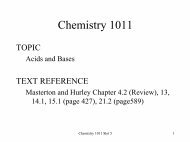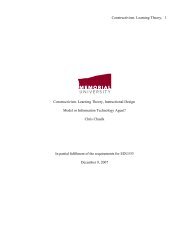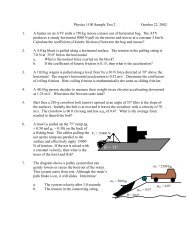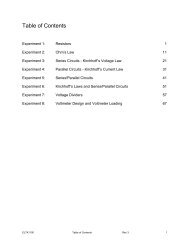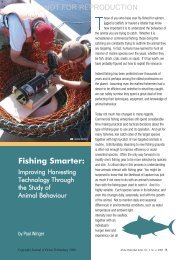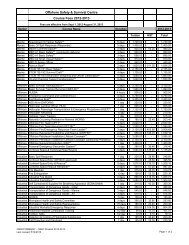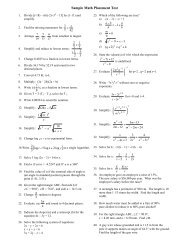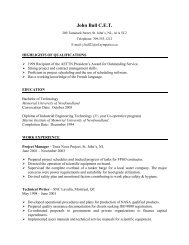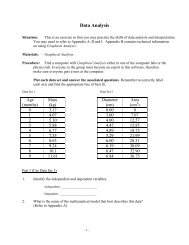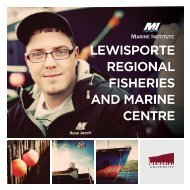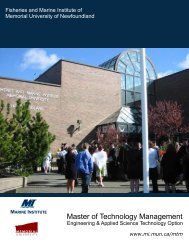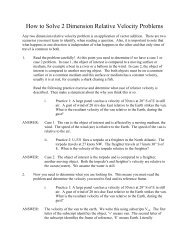Academic Calendar - Fisheries and Marine Institute - Memorial ...
Academic Calendar - Fisheries and Marine Institute - Memorial ...
Academic Calendar - Fisheries and Marine Institute - Memorial ...
Create successful ePaper yourself
Turn your PDF publications into a flip-book with our unique Google optimized e-Paper software.
COURSE DESCRIPTIONS<br />
FITE 0001 (Introduction to Fishing Gear<br />
Construction <strong>and</strong> Repair)<br />
This course introduces participants to fishing gear construction<br />
<strong>and</strong> repair.<br />
Introduction to Trawls; Basic Net Making Knowledge; Basic Net<br />
Repair; Application of Conservation Technologies; Mobile Gear<br />
Construction <strong>and</strong> Repair Techniques; Trawl Operations <strong>and</strong><br />
Further Equipment; Net Making for Fixed Gears; Principles <strong>and</strong><br />
Uses of Rope <strong>and</strong> Wire<br />
Duration -10 days<br />
FITE 0002 (Introduction to Construction <strong>and</strong><br />
Stability for Fishing Vessels)<br />
Fishing vessel construction <strong>and</strong> stability are important,<br />
interconnected areas of study to ensure the safe operation <strong>and</strong><br />
h<strong>and</strong>ling of fishing vessels. It is essential that vessel operators<br />
have a good underst<strong>and</strong>ing of the relationships that exist<br />
between the vessels shape, builder’s plans <strong>and</strong> how a completed<br />
hull operates in a marine environment. This course is specifically<br />
directed towards fishing vessel operators <strong>and</strong> deals with the<br />
basic theory <strong>and</strong> application of construction <strong>and</strong> stability as it<br />
applies to fishing vessels in various conditions of load.<br />
Basic Ship Measurement <strong>and</strong> Design Terminology; Hull<br />
Shapes <strong>and</strong> Structural Terminology; Vessel Seaworthiness<br />
<strong>and</strong> Regulatory Requirements; Essential Vessel Systems <strong>and</strong><br />
Inspection Protocol; Basic Ship Stability Terminology; Basic<br />
Transverse Stability Principles; Interpreting Righting Lever<br />
Curves; Basic Longitudinal Stability Principles; Principles of Free<br />
Surface Effect, Freeboard <strong>and</strong> Reserve Buoyancy; Anti Roll<br />
Devices <strong>and</strong> Vessel Stability; Vessel Modifications <strong>and</strong> Its Effect<br />
on Stability; Interpreting Stability Booklet Data; Effect of Fishing<br />
Operations on Vessel Stability; Environmental Effects on Stability<br />
- The Dynamics<br />
Duration - 10 Days (70 Hours)<br />
FITE 0004 (Information Systems in <strong>Fisheries</strong>)<br />
This course has been developed to enable the fish harvester to<br />
maximize the use of the computer at sea. This course includes<br />
distinct components of electronic navigation, managing fishing<br />
data, collision avoidance <strong>and</strong> communication.<br />
The Windows® Operating System Environment; Electronic<br />
Navigational Chart ~ Definitions, Concepts <strong>and</strong> Related<br />
Authorities; Legal Aspects <strong>and</strong> Requirements for Fishing Vessels;<br />
Sensors <strong>and</strong> Interfaces; Electronic Chart Data; Navigating<br />
with the Electronic Charting System; Passage Planning with<br />
the Electronic Chart; Executing <strong>and</strong> Monitoring the Passage<br />
Plan; System Status Alarms <strong>and</strong> Indicators; Risk of Overreliance;<br />
Fishing Data Management; Back-up Arrangements;<br />
Collision Avoidance Information Management; Bottom Mapping;<br />
Communications<br />
Prerequisites - Chartwork <strong>and</strong> Pilotage _ Level 1 (C/P 1) ) or<br />
equivalent<br />
Duration - 70 hours = 10 days<br />
FITE 0005 (Ropework)<br />
This course is designed to develop the participant’s ability to<br />
underst<strong>and</strong> the design <strong>and</strong> construction of various types of rope,<br />
maintenance <strong>and</strong> inspection of ropes, <strong>and</strong> regulations governing<br />
rope usage. It will include rope safety, rope use <strong>and</strong> maintenance<br />
for small vessels, <strong>and</strong> moorings <strong>and</strong> anchoring.<br />
Ropes; Knots, Bends <strong>and</strong> Hitches; Ropework/Working with<br />
Ropes; Rope Safety; Mooring <strong>and</strong> Anchoring<br />
Duration - 2.5 days<br />
FLDS 1200 (Introduction to Fluid Mechanics<br />
& Hydraulics)<br />
This course is designed as an introduction to the laws <strong>and</strong><br />
principles that govern Fluid Mechanics <strong>and</strong> Hydraulics. Students<br />
will be able to apply these principles to relevant Electro-<br />
Mechanical applications.<br />
Introduction to Fluid Mechanics: Work <strong>and</strong> Energy of Fluids<br />
in Motion, , Steady Flow of Ideal Fluids, Hydraulic Principles,<br />
Hydraulic System <strong>and</strong> Schematics, Hydraulic Fluids, Hydraulic<br />
Hoses <strong>and</strong> Pipes, Seals <strong>and</strong> Packing, Reservoir Design <strong>and</strong><br />
Function, Contamination Control <strong>and</strong> Filtration, Linear Activators,<br />
Pumps <strong>and</strong> Motors, Directional Control Valves, Pressure Control<br />
Valves, Flow Control Valves, Hydraulic System Accessories,<br />
Troubleshooting<br />
Prerequisites - PHYS 1100 (Physics) or PHYS 1101 (Physics) or<br />
PHYS 1102 (Physics)<br />
Duration - 13 weeks<br />
Lectures - 4 hours/week = 52 hours total<br />
Laboratories - 2 hours/week every second week for 6 labs = 12<br />
hours.<br />
FLDS 2100 (Fluid Mechanics)<br />
This is an introductory Fluid Mechanics course designed to<br />
develop both the knowledge of the laws <strong>and</strong> principles governing<br />
Fluid Mechanics <strong>and</strong> the ability to apply this knowledge in<br />
analyzing related engineering applications. The course also<br />
provides a base for advanced courses in piping design, ducting<br />
design, <strong>and</strong> fluid power systems.<br />
Introduction to Fluid Mechanics; Forces on Submerged<br />
Surfaces; Work <strong>and</strong> Energy of Fluids in Motion; Steady Flow of<br />
Incompressible Fluids; Flow Measurement<br />
Prerequisites - MATH 1100 (Pre-Calculus) or MATH 1102 (Pre-<br />
Calculus); PHYS 1100 (Physics) or PHYS 1101 (Physics)<br />
Duration - 13 weeks instruction, exclusive of final examination<br />
Lectures - 3 hours/week = 39 hours total<br />
Laboratories - 2 hours/week every second week for 6 labs = 12<br />
hours<br />
FLDS 2105 (Fluid Mechanics)<br />
This is an introductory Fluid Mechanics course designed to<br />
develop both the knowledge of the laws <strong>and</strong> principles governing<br />
Fluid Mechanics <strong>and</strong> the ability to apply this knowledge in<br />
analyzing related engineering applications. The course also<br />
provides a base for advanced courses in piping design, ducting<br />
design, <strong>and</strong> fluid power systems.<br />
164



